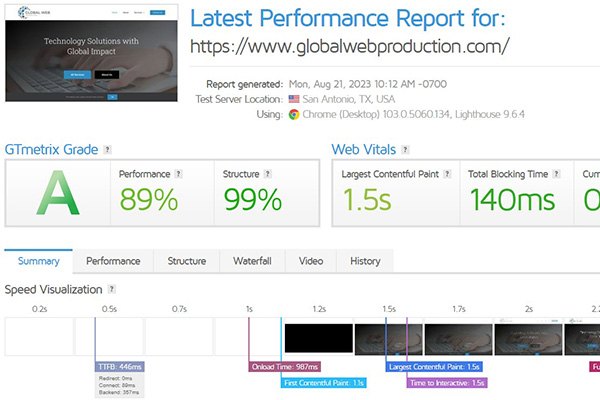by Byron Prather
Share
by Byron Prather
Share

One of the services that we offer is website optimization otherwise known as page load time (PLT.) It was a major area of my focus while I was at Microsoft. Why should you be concerned about page load time? Here are some good thoughts on the subject. We would be more than happy to help you with this area of focus for your business.
Page load time, also known as website or webpage load time, refers to the amount of time it takes for a web page to fully load and display its content in a user’s web browser. The importance of page load time cannot be overstated, as it directly impacts user experience, search engine rankings, and overall business success. Here are some reasons why page load time is crucial:
- User Experience: The primary reason for focusing on page load time is to provide a positive user experience. Slow-loading pages frustrate users and can lead to high bounce rates, where visitors leave your site without interacting with any content. In today’s fast-paced digital world, users expect quick and seamless interactions. A fast-loading website improves user satisfaction, encourages engagement, and increases the likelihood of users staying on your site longer.
- Conversion Rates: Slow page load times can have a negative impact on conversion rates. Whether your website’s goal is to sell products, gather leads, or encourage certain actions, a slow-loading page can deter users from completing these desired actions. Studies have shown that even a slight delay in page load time can lead to a significant drop in conversion rates.
- Search Engine Rankings: Search engines like Google consider page load time as a ranking factor. Websites that load quickly are more likely to rank higher in search engine results pages (SERPs). Google’s algorithm takes into account user experience, and slow-loading pages are often seen as providing a poor user experience. This means that improving page load time can contribute to better search engine visibility and organic traffic.
- Mobile Performance: With the increasing use of mobile devices to access the internet, page load time becomes even more critical. Mobile networks might not be as fast or stable as wired connections, and mobile users are often on the go. Slow-loading pages can lead to frustration and a higher likelihood of users abandoning the site, especially on mobile devices.
- Competitive Edge: In a competitive online landscape, a faster website can give you a competitive advantage. If your website loads quickly while your competitors’ sites are slow, users are more likely to choose your site over others. This can lead to increased user engagement, conversions, and brand loyalty.
- Accessibility: A fast-loading website is more accessible to users with slower internet connections or older devices. It ensures that a wider range of users can access your content without being hindered by slow loading times.
- Server Cost Optimization: Faster page load times can also result in more efficient server resource usage. When pages load quickly, the server handles requests more efficiently, reducing the load on your hosting infrastructure and potentially leading to cost savings.
- Third-Party Integrations: Many websites rely on third-party scripts, plugins, and integrations to provide additional functionality. However, these can also impact page load times. Optimizing these integrations and scripts can help maintain a balance between functionality and performance.
In summary, page load time directly affects user satisfaction, engagement, conversion rates, search engine rankings, and overall business success. Prioritizing optimization efforts to improve page load time is essential for creating a positive user experience and achieving your online goals. Please contact us today for a free evaluation.

